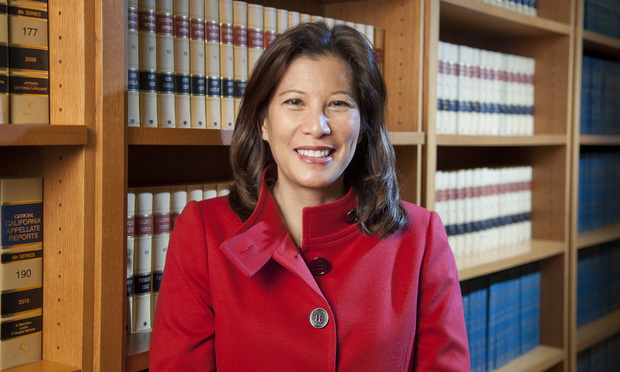California's Chief Justice on Challenging Norms
"You can look at some of the things that I've said and done and think, well, is she pro-prosecution? Is she pro-labor? What is she for? But all issues to me are things to give thought to. there isn't any one right approach to all of them."
June 27, 2019 at 05:40 PM
6 minute read
 Chief Justice Tani Cantil Sakauye
Chief Justice Tani Cantil Sakauye
As she approaches her 10th year as the leader of California's judiciary, Tani Cantil-Sakauye, chief justice of the California Supreme Court, is enjoying decidedly better conditions than she did in her first years on the bench.
The state's budget is flush, offering new judgeships and more money for a judicial branch that was hit by draconian spending cuts after Cantil-Sakauye was sworn in in 2010. The criticism leveled at her by fellow jurists early in her tenure—she was once deemed too bureaucratic by a group known as the Alliance of California Judges—has largely waned, and California's new governor has showered her with public praise for "her leadership and her stubbornness" in lobbying for the judiciary.
Cantil-Sakauye's willingness to challenge the Trump administration's policies on tracking undocumented immigrants in courthouses and her decision to drop her Republican voter registration after the confirmation hearings for U.S. Supreme Court Justice Brett Kavanaugh have given her a national platform.
The jurist recently spoke with The National Law Journal about her first near-decade in office and what may be in her future. The interview has been edited for length and clarity.
Did you think you were taking a risk two years ago when you wrote a letter to then-Attorney General Jeff Sessions, calling on U.S. Immigration and Customs Enforcement to stay out of California's courthouses?
Oh sure. I knew it would alienate a lot of people, and I knew that it would be poking the bear. But at that point, I hadn't heard a lot of people speaking about it, and I thought, and still think, it's such a travesty and so dangerous to communities. It's just unwise.
But at the same time, I felt like it had to be said. And if it wasn't me saying it, then who would say it? As many people support it as don't. But I think that's where we can agree to differ on the policy involved because I was careful in my letter, not to tread on law but on policy.
Turning to the issue of the bombshell you dropped last year that you had switched your Republican Party registration …
I didn't think it was a bombshell. I did it quietly. I'd been thinking about it for some time. And I just sort of saw this chipping away of all these things I hold dear in my values. I just quietly thought I can't be part of this anymore.
It's so separate from what I spend my conscious hours doing every day at work. Changing to an NPP, no party preference, is really more in accord and really flows more with what I do if I were to ever think about my political view of issues. It's kind of freeing actually.
Is it? Because you were part of a Republican governor's administration. [Cantil-Sakauye served as deputy legal affairs secretary in the administration of former California Gov. George Deukmejian.]
I was. I talked to people in the administration I served, and I said, this is where I am. And they said, "Oh no, no, no, think about it, think about it." And I talked to my husband. And I talked to friends. Because it is very personal. And people were like, "Don't do it, think about it, wait, wait, wait." And I just couldn't wait after certain events happened, as I said. It just became one of those moral imperatives.
 California Governor Arnold Schwarzenegger, left, and Tani Cantil Sakauye, right, along with Chief Justice Ronald George, not pictured, during a press conference introducing Cantil Sakauye as the next California Supreme Court Justice. July 22, 2019.
California Governor Arnold Schwarzenegger, left, and Tani Cantil Sakauye, right, along with Chief Justice Ronald George, not pictured, during a press conference introducing Cantil Sakauye as the next California Supreme Court Justice. July 22, 2019.What was it about the Kavanaugh confirmation hearings that gave you heartburn?
It was actually a combination of things. It was the politicization of the United States Supreme Court appointments. It was the raw personalities that came face to face with these allegations. Allegations are not for this court. There ought to be a more robust, transparent process for addressing these to either put them to bed, to clearly indicate that they either are or they aren't, and to proceed in a dignified fashion. And I felt it wasn't any of those things.
I watched the hearings not as a chief or as a judge, but I watched them as a Californian born in this country. And I watched it thinking of my two daughters. And I thought, given all we stand for … I couldn't be part of it anymore.
But you didn't register as a Democrat.
No. I decided it is no party preference. It is truly that it reflects how I come to decisions. You can look at some of the things that I've said and done and think, well, is she pro-prosecution? Is she pro-labor? What is she for? But all issues to me are things to give thought to. There isn't any one right approach to all of them. So I thought it's best and more freeing to have no preference but to look at things fresh and new.
The bar exam cut score is coming under fire, again, after the pass rates in California have slumped. What's your response to that criticism?
I realize there is continuing criticism of the 2017 decision by this court not to change the cut score. But we also said in the letter that we'd take another look, and I think we're waiting for the content validation study, which is being reviewed now I believe and maybe we'll have another proposed letter from the stakeholders in late 2019 or 2020 for us to reconsider. And we'll have more information to consider.
Do you plan to stand for a retention election in 2022?
I have no plans to, but I have no plans not to. I don't know yet. This year I could retire. I could retire in October. I would be of age and I have way more years than I need, and I could walk away and do something else.
But I'm knee-deep right now in projects and working with people. It's the quietest it's been [during my term], so why leave when it's quiet? I have three more years after this year on my term. We have a great governor, and he's dynamic and fluid anda interesting. And the Legislature—we know each other. That took a while.
I haven't made any long-term plans. I'm open, but I haven't made any long-term plans.
This content has been archived. It is available through our partners, LexisNexis® and Bloomberg Law.
To view this content, please continue to their sites.
Not a Lexis Subscriber?
Subscribe Now
Not a Bloomberg Law Subscriber?
Subscribe Now
NOT FOR REPRINT
© 2025 ALM Global, LLC, All Rights Reserved. Request academic re-use from www.copyright.com. All other uses, submit a request to [email protected]. For more information visit Asset & Logo Licensing.
You Might Like
View All
US Patent Innovators Can Look to International Trade Commission Enforcement for Protection, IP Lawyers Say

Zuckerman Spaeder Gets Ready to Move Offices in DC, Deploy AI Tools in 2025
5 minute read
Outgoing USPTO Director Kathi Vidal: ‘We All Want the Country to Be in a Better Place’
19 minute read
Ex-Deputy AG Trusts U.S. Legal System To Pull Country Through Times of Duress
7 minute readTrending Stories
Who Got The Work
J. Brugh Lower of Gibbons has entered an appearance for industrial equipment supplier Devco Corporation in a pending trademark infringement lawsuit. The suit, accusing the defendant of selling knock-off Graco products, was filed Dec. 18 in New Jersey District Court by Rivkin Radler on behalf of Graco Inc. and Graco Minnesota. The case, assigned to U.S. District Judge Zahid N. Quraishi, is 3:24-cv-11294, Graco Inc. et al v. Devco Corporation.
Who Got The Work
Rebecca Maller-Stein and Kent A. Yalowitz of Arnold & Porter Kaye Scholer have entered their appearances for Hanaco Venture Capital and its executives, Lior Prosor and David Frankel, in a pending securities lawsuit. The action, filed on Dec. 24 in New York Southern District Court by Zell, Aron & Co. on behalf of Goldeneye Advisors, accuses the defendants of negligently and fraudulently managing the plaintiff's $1 million investment. The case, assigned to U.S. District Judge Vernon S. Broderick, is 1:24-cv-09918, Goldeneye Advisors, LLC v. Hanaco Venture Capital, Ltd. et al.
Who Got The Work
Attorneys from A&O Shearman has stepped in as defense counsel for Toronto-Dominion Bank and other defendants in a pending securities class action. The suit, filed Dec. 11 in New York Southern District Court by Bleichmar Fonti & Auld, accuses the defendants of concealing the bank's 'pervasive' deficiencies in regards to its compliance with the Bank Secrecy Act and the quality of its anti-money laundering controls. The case, assigned to U.S. District Judge Arun Subramanian, is 1:24-cv-09445, Gonzalez v. The Toronto-Dominion Bank et al.
Who Got The Work
Crown Castle International, a Pennsylvania company providing shared communications infrastructure, has turned to Luke D. Wolf of Gordon Rees Scully Mansukhani to fend off a pending breach-of-contract lawsuit. The court action, filed Nov. 25 in Michigan Eastern District Court by Hooper Hathaway PC on behalf of The Town Residences LLC, accuses Crown Castle of failing to transfer approximately $30,000 in utility payments from T-Mobile in breach of a roof-top lease and assignment agreement. The case, assigned to U.S. District Judge Susan K. Declercq, is 2:24-cv-13131, The Town Residences LLC v. T-Mobile US, Inc. et al.
Who Got The Work
Wilfred P. Coronato and Daniel M. Schwartz of McCarter & English have stepped in as defense counsel to Electrolux Home Products Inc. in a pending product liability lawsuit. The court action, filed Nov. 26 in New York Eastern District Court by Poulos Lopiccolo PC and Nagel Rice LLP on behalf of David Stern, alleges that the defendant's refrigerators’ drawers and shelving repeatedly break and fall apart within months after purchase. The case, assigned to U.S. District Judge Joan M. Azrack, is 2:24-cv-08204, Stern v. Electrolux Home Products, Inc.










